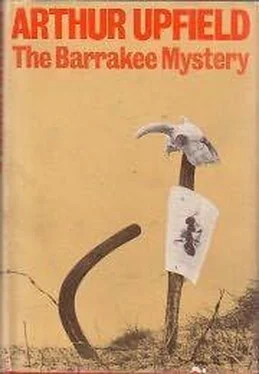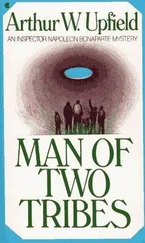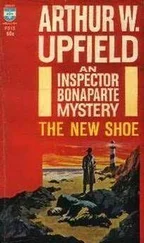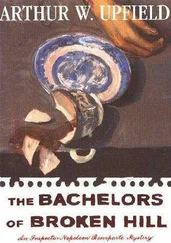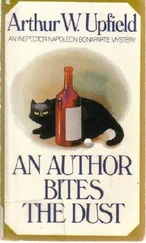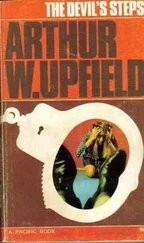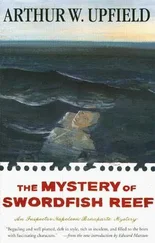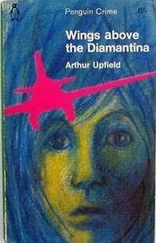Arthur Upfield - The Barrakee Mystery
Здесь есть возможность читать онлайн «Arthur Upfield - The Barrakee Mystery» весь текст электронной книги совершенно бесплатно (целиком полную версию без сокращений). В некоторых случаях можно слушать аудио, скачать через торрент в формате fb2 и присутствует краткое содержание. Жанр: Классический детектив, на английском языке. Описание произведения, (предисловие) а так же отзывы посетителей доступны на портале библиотеки ЛибКат.
- Название:The Barrakee Mystery
- Автор:
- Жанр:
- Год:неизвестен
- ISBN:нет данных
- Рейтинг книги:4 / 5. Голосов: 1
-
Избранное:Добавить в избранное
- Отзывы:
-
Ваша оценка:
- 80
- 1
- 2
- 3
- 4
- 5
The Barrakee Mystery: краткое содержание, описание и аннотация
Предлагаем к чтению аннотацию, описание, краткое содержание или предисловие (зависит от того, что написал сам автор книги «The Barrakee Mystery»). Если вы не нашли необходимую информацию о книге — напишите в комментариях, мы постараемся отыскать её.
The Barrakee Mystery — читать онлайн бесплатно полную книгу (весь текст) целиком
Ниже представлен текст книги, разбитый по страницам. Система сохранения места последней прочитанной страницы, позволяет с удобством читать онлайн бесплатно книгу «The Barrakee Mystery», без необходимости каждый раз заново искать на чём Вы остановились. Поставьте закладку, и сможете в любой момент перейти на страницу, на которой закончили чтение.
Интервал:
Закладка:
Dear Mr Sinclair,
Thank you for your letter written from White Cliffs. Your thanks for what I did for your poor sister are appreciated, as is your assurance that never will you speak ofthe fact that I have adopted her child or claim relationship to it. I did all I could for Mary, and now you must do all you can for me and the child.
I have paid King Henry over?20, and now he is demanding more. I have thought and thought about this menace till my head aches. What can I do? Can you do something to seal his lips and stop his demands? It would be no crime to slay a black-would it?
Ann Thornton.”
“Am I to understand that King Henry was Ralph’s father?” exclaimed the squatter; and, not waiting for Bony to reply, turned to the Little Lady: “Tell me, Ann, is that so?”
In reply she nodded, but kept her eyes unseeingly upon her shoe. Thornton’s breath hissed between his teeth. He would have spoken, had not his wife said very softly:
“Let Mr Bonaparte go on. This is my Waterloo.”
“We know how Sinclair, calling himself Clair, replied to that letter,” Bony continued. “Somehow King Henry learned of Clair’s determination to kill him, and fled. Clair tracked him for more than nineteen years. A report being circulated that Sinclair was dead, King Henry returned to his people. As he himself said to Mr Dugdale, he made an appointment with somebody at Barrakee-we will presume with Martha-and Sinclair, hearing of this, as we will again presume, waited in the dark for the black fellow to come down the river.
“We know, or rather the police know, that Sinclair spent many years in North Queensland and there learned the art of throwing a boomerang. In his confession, written an hour or two before his death in Mr Dugdale’s hut, he describes how he missed his throw, how the boomerang returned, how they both stooped for the weapon. Sinclair got it and struck King Henry whilst the latter was still stooping forward.
“There is one point which still remains unexplained. It happened that one day a gentleman named Pincher Joe ransacked Mrs Thornton’s boudoir, and among other things he stole a boomerang. Without any shadow of doubt it was the boomerang which killed King Henry, because it was made by a member of the tribe with which Sinclair sojourned. It bears the marks of the tribe on it, and it left an outline of those marks when it struck a gum-tree instead of King Henry when thrown. Either Martha was at the meeting place and handed the weapon to Mrs Thornton, or Mrs Thornton herself was present and picked it up.
“Parallel with this story, we have the parentage of Ralph and its effect upon him. Like many half-caste children-even like myself-the baby was white of skin. For years the black strain in his blood was held in abeyance by his upbringing and education; for years the pigmentation of his skin remained white. But the inevitable change of colour began much earlier than the heredity of character. The cessation of college life, the return to the native bush of his father, hastened the hereditary urge, so that Ralph’s reversion to ancestral blackness was accelerated.
“In no case does a half-caste rise to the status of his superior parent. In this case we have the mother possessing, as all white people possess, a veneer of what we call civilization; and the father full-blooded and wild, able to speak the white man’s language, but without the mother’s veneer of civilization.
“I watched the growing change in the lad, and for a long time it puzzled me. I saw the growing love of colour in hisclothes, I noted how quickly his college accent dropped from him. For many years at school, and only for short periods in the bush when on holidays, the young man picked up the art of tracking with remarkable ease. You will remember how he tracked the dingo and slew it. You will remember how he caught the outlaw horse at Thurlow Lake and rode it. He took to the bush as a duck takes to water, he who most of his life was away at school.
“The lure of the bush gripped him. I could see it in his face, and I marvelled. He felt the lure and could not explain it even to himself. And then came this last, this fatal yet inevitable surrender. He fell in love with a black gin. He was betrothed to a beautiful white girl, he was heir to a great estate, yet he fell in love with a gin. Mr Dugdale reasoned with him. I discovered the affair and pleaded with the girl. She went away, persuaded by me, but the youth learned of her whereabouts and wrote passionate letters, and she, being a woman, and a poor ignorant black woman, too, could not resist.
“Blame not the boy, Little Lady. You could not wipe from his heart the lure of the bush planted by his black father, not with all your forethought, all your love. Do not blame nor cherish anger against him, Mr Thornton. Would you be happy in the city now? Would you not long for the bush? You are wholly white, but the lad was half black, half wild, half of the bush. And you, Miss Flinders, bear no rancour for the wrong done you. Crimson lips and black velvet cheeks were a greater magnet than your lily complexion and azure eyes. For countless ages his ancestors found beauty in large black eyes and black velvet cheeks.
“The boy fought his battle, the battle which could end only in his defeat. I watched and wondered. I saw a headstone in the cemetery bearing the name of Mary Sinclair. I knew Clair’s name was Sinclair, from a friend in North Queensland who remembered him. And at last I saw the light. I saw clearly how Mrs Thornton’s maternal desires overwhelmed her judgement, her prudence, even her morality. As I have said, she took to her bosom an asp.
“I knew what she knew. I knew that Ralph Thornton was to marry Miss Flinders, that Miss Flinders, unknowingly, would marry a half-caste Australian aboriginal. The wonder of it was that neither she nor Mr Thornton guessed. Even during the few months I have been at Barrakee, I have seen Ralph’s skin slowly darkening, as my skin slowly darkened when I was his age. Five or six more years at the outside, and the colour of his skin will be as mine is.
“My duty, then, was clear. Sinclair, in his letter to Mrs Thornton, written just before he died-for even the water has not obliterated the drops of blood which I assume fell from his lips-rings clear the call of Duty. This is what it says:
Dear Mrs Thornton,
I am dying, and have but a few hours at most to live. Friends have been supplying me with tucker, but Knowles got me. If he hadn’t, some other policeman would. Only yesterday I heard that your adopted son is betrothed to the Darling of the Darling, and that is not right. You must not let that be: you must not wrong a white woman. Let her be told, and then if she wishes they can marry.
You know me for a poor man, my sister for a poor working woman. Yet our people were high, and always did we keep our colour. Keep yours. Do not let your love of Mary’s child blind your eyes to facts.
You are safe, Little Lady. I am about to pay the price for all you did for Mary. When I die, I die free of debt to you. And dead, I demand of you that this marriage does not take place.
Till the end,
Your obedient servant,
William Sinclair.”
Bony refolded the letter and put it back in the envelope. In the same envelope he put Mrs Thornton’s letter to Sinclair, and then for a while regarded her and her husband and niece with curious intensity.
Memory of a Sydney waxwork exhibition occurred to him in gazing at the Little Lady. The waxen pallor of her face, the expressionless immobility of her features, the absolute stillness of her body, caused her to resemble nothing so much as a dainty doll. What she was thinking or what she felt was hidden by a deathlike mask. Her husband, seated at her side, appeared shrunken in stature, hardly recognizable for the hale, bluff, and genial squatter of Barrakee. Kate, only Kate, retained her vividness, but down her cheeks Bony observed that now and then ran unheeded a tear.
Читать дальшеИнтервал:
Закладка:
Похожие книги на «The Barrakee Mystery»
Представляем Вашему вниманию похожие книги на «The Barrakee Mystery» списком для выбора. Мы отобрали схожую по названию и смыслу литературу в надежде предоставить читателям больше вариантов отыскать новые, интересные, ещё непрочитанные произведения.
Обсуждение, отзывы о книге «The Barrakee Mystery» и просто собственные мнения читателей. Оставьте ваши комментарии, напишите, что Вы думаете о произведении, его смысле или главных героях. Укажите что конкретно понравилось, а что нет, и почему Вы так считаете.
